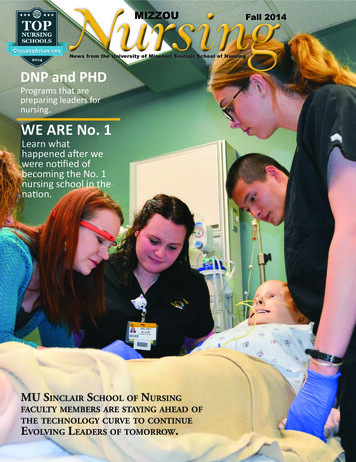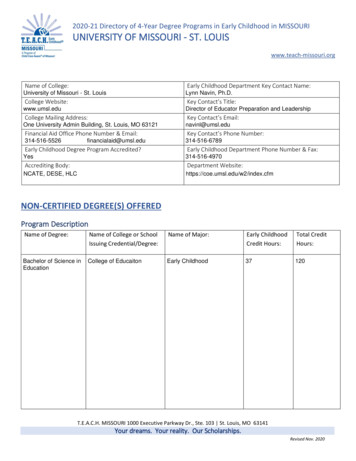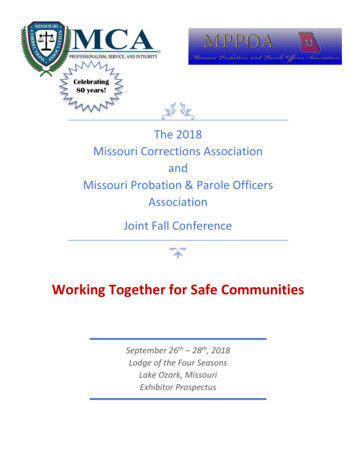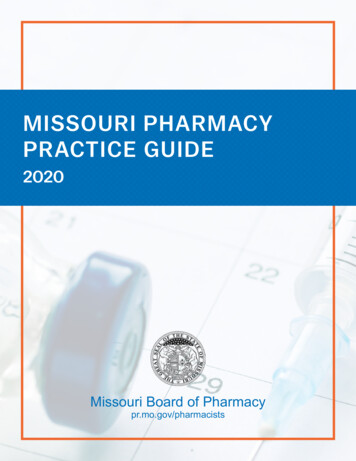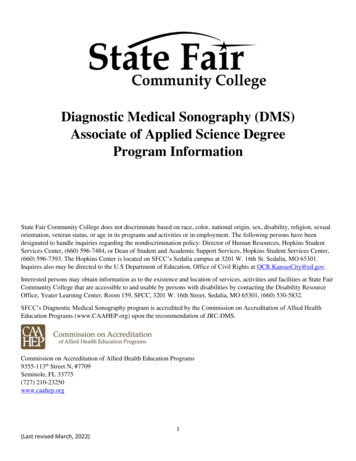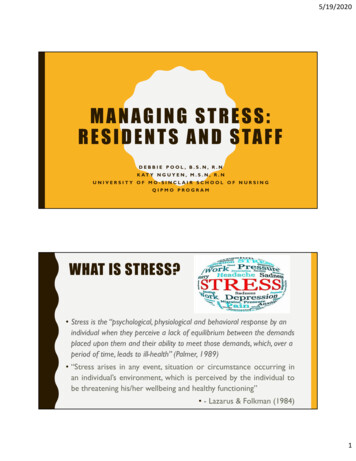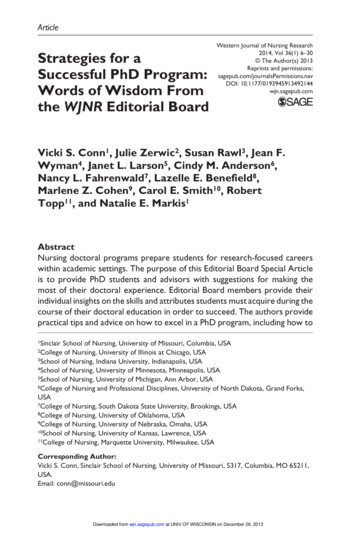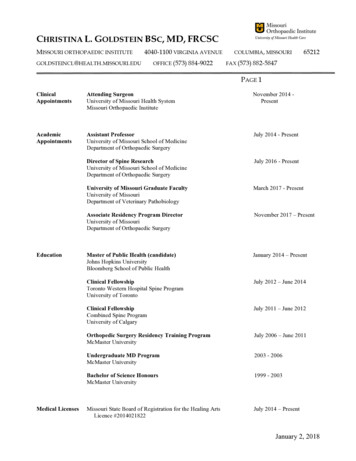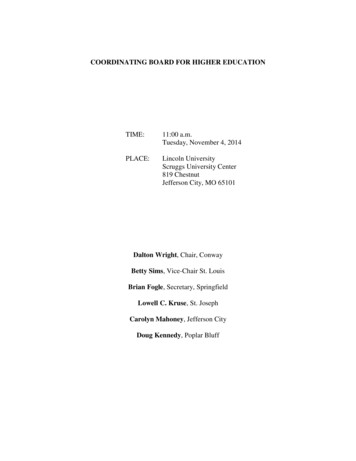
Transcription
COORDINATING BOARD FOR HIGHER EDUCATIONTIME:11:00 a.m.Tuesday, November 4, 2014PLACE:Lincoln UniversityScruggs University Center819 ChestnutJefferson City, MO 65101Dalton Wright, Chair, ConwayBetty Sims, Vice-Chair St. LouisBrian Fogle, Secretary, SpringfieldLowell C. Kruse, St. JosephCarolyn Mahoney, Jefferson CityDoug Kennedy, Poplar Bluff
COORDINATING BOARD FOR HIGHER EDUCATIONTuesday, November 4, 2014Lincoln University, Scruggs University Center819 Chestnut, Jefferson City, MO 6510111:000 a.m. – 12:30 p.m.AGENDAAction1.2.3.State Authorization Reciprocity Agreement – SARARecommendations of the CBHE Performance FundingTask ForceRequested Performance Funding Model ChangesTab ATab BLeroy WadeLeroy WadeTab CLeroy WadeGeneral BusinessInformation1.CBHE December 10, 2014 MeetingAction1.Adjourn Public Session of Coordinating Board for Higher EducationDavid Russell
AGENDA ITEM SUMMARYAGENDA ITEMState Authorization Reciprocity AgreementCoordinating Board for Higher EducationNovember 4, 2014DESCRIPTIONThe State Authorization Reciprocity Agreement is the product of a nationwide effort to create asystem of reciprocity among state regulatory agencies for the delivery of distance education.This item is intended to request approval to proceed with filing the related administrative rulewith the Secretary of State and to submit the application to the Midwest Higher EducationCompact for Missouri to participate in the SARA process.BackgroundThe fundamental goal of SARA is to provide a national solution to barriers created by stateshaving different regulations regarding oversight of distance education institutions and programs.These regulations may result in varied levels of student protection and quality assurance.Representatives from the Council of State Governments, the Presidents’ Forum, the Commissionon the Regulation of Postsecondary Distance Education and the four regional compactorganizations worked together to establish the National Council for State AuthorizationReciprocity Agreements. The purpose of NC-SARA is to ensure the SARA initiative offers anational solution rather than separate regional solutions.SARA in the Midwest RegionThe Midwestern Higher Education Compact is the regional compact in which Missouriparticipates. MHEC employed staff to assist member states as they prepared to sign on to thereciprocity agreement. With the exception of Michigan and Wisconsin, all of the MHECmember states have passed legislation to authorize participation in SARA. As of October 15,2014, three of the 12 MHEC member states (Indiana, Nebraska and North Dakota) have beenapproved to participate in SARA.SARA in MissouriDuring the 2014 session, the legislature passed, and the Governor signed, House Bill 1389providing the necessary authority for Missouri to participate in the Midwest-SARA agreement.The legislation grants authority to the Coordinating Board to enter into such agreements onbehalf of the state and establishes a basic framework for the activities necessary to comply withthe requirements of the reciprocity agreements. Those activities include review and approval ofinstitutional participation, verification of the existence of basic consumer protection components,and establishment of a process to resolve complaints related to education delivered through thereciprocity agreement.Coordinating Board for Higher EducationNovember 4, 2014
In order to successfully complete an application for participation by Missouri, the CBHE mustestablish a regulatory framework and process for implementing the SARA requirements.Attached to this agenda summary is the final draft of the proposed administrative rule for theimplementation of SARA. It was developed initially by a team of MDHE staff, reviewed by thePresidential Advisory Committee as part of the September 2014 CBHE meeting, and publicizedfor comment by the higher education community on the MDHE website. All comments weresupportive of the rule, with one making suggestions for minor changes, which were incorporatedinto this current version. The changes made since the September CBHE meeting are underlinedin the attachment.In addition, the draft rule was reviewed by staff of the Midwest Higher Education Compact andthe National Council for State Authorization Reciprocity Agreements. This draft was providedto the MHEC SARA Steering Committee and has received recommendation for approval by theMHEC Board, pending approval by the CBHE.Next StepsUpon approval by the CBHE, MDHE staff will begin the standard rulemaking process with theOffice of the Secretary of State, which also includes a public comment period. In addition, theMDHE will notify MHEC of the approval of the rule and application for Missouri participationin SARA. Final action by MHEC is expected at the next commission meeting on November16th.STATUTORY REFERENCEChapter 173.030, RSMo,RECOMMENDED ACTIONIt is recommended that the Coordinating Board approve the attached draft administrativerule and direct the Commissioner to file the rule with the Secretary of State so that it maybecome effective at the earliest possible date.It also is recommended that the Coordinating Board approve the attached completedapplication for Missouri’s participation in the State Authorization Reciprocity Agreementas tentatively approved by the Midwest Higher Education Compact SARA SteeringCommittee.ATTACHMENT(S)Attachment A:House Bill 1389Attachment B:Proposed Administrative Rule for Missouri’s Participation in the MidwestState Authorization Reciprocity AgreementAttachment C:Application to Participate in the State Authorization ReciprocityAgreementCoordinating Board for Higher EducationNovember 4, 2014
SECOND REGULAR SESSION[TRULY AGREED TO AND FINALLY PASSED]HOUSE COMMITTEE SUBSTITUTE FORHOUSE BILL NO. 138997TH GENERAL ASSEMBLY4863L.03T2014AN ACTTo repeal sections 173.030 and 174.450, RSMo, and to enact in lieu thereof two new sectionsrelating to state authorization of reciprocity agreements for distance education.Be it enacted by the General Assembly of the state of Missouri, as follows:2234567891011121314151617Section A. Sections 173.030 and 174.450, RSMo, are repealed and two new sections enactedin lieu thereof, to be known as sections 173.030 and 174.450, to read as follows:173.030. The coordinating board, in addition, shall have responsibility, within theprovisions of the constitution and the statutes of the state of Missouri, for:(1) Requesting the governing boards of all state-supported institutions of highereducation, and of major private institutions to submit to the coordinating board any proposedpolicy changes which would create additional institutions of higher education, additionalresidence centers, or major additions in degree and certificate programs, and make pertinentrecommendations relating thereto;(2) Recommending to the governing board of any institution of higher education in thestate the development, consolidation, or elimination of programs, degree offerings, physicalfacilities or policy changes where that action is deemed by the coordinating board as in the bestinterests of the institutions themselves and/or the general requirements of the state.Recommendations shall be submitted to governing boards by twelve months preceding the termin which the action may take effect;(3) Recommending to the governing boards of state-supported institutions of highereducation, including public community colleges receiving state support, formulas to be employedin specifying plans for general operations, for development and expansion, and for requests forappropriations from the general assembly. Such recommendations will be submitted to theEXPLANATION — Matter enclosed in bold-faced brackets [thus] in the above bill is not enacted and is intendedto be omitted from the law. Matter in bold-face type in the above bill is proposed language.
HCS HB 414243444546474849505152532governing boards by April first of each year preceding a regular session of the general assemblyof the state of Missouri;(4) Promulgating rules to include selected off-campus instruction in public college anduniversity appropriation recommendations where prior need has been established in areasdesignated by the coordinating board for higher education. Funding for such off-campusinstruction shall be included in the appropriation recommendations, shall be determined by thegeneral assembly and shall continue, within the amounts appropriated therefor, unless the generalassembly disapproves the action by concurrent resolution;(5) Coordinating reciprocal agreements between or among Missouri state institutions ofhigher education at the request of one or more of the institutions party to the agreement, andbetween or among Missouri state institutions of higher education and publicly supported highereducation institutions located outside the state of Missouri at the request of any Missouriinstitution party to the agreement;(6) Entering into agreements for interstate reciprocity regarding the delivery ofpostsecondary distance education, administering such agreements, and approving ordisapproving applications to participate in such agreements from a postsecondaryinstitution that has its principal campus in the state of Missouri:(a) The coordinating board shall establish standards for institutional approval.Those standards shall include, but are not limited to the:a. Definition of physical presence for non-Missouri institutions serving Missouriresidents consistent with other states' definitions of physical presence; andb. Establishment of consumer protection policies for distance education addressingrecruitment and marketing activities; disclosure of tuition, fees, and other charges;disclosure of admission processes and procedures; and student complaints;(b) The coordinating board shall establish policies for the review and resolution ofstudent complaints arising from distance education programs offered under the agreement;(c) The coordinating board may charge fees to any institution that applies toparticipate in an interstate postsecondary distance education reciprocity agreementauthorized pursuant to this section. Such fees shall not exceed the coordinating board forhigher education's cost of reviewing and evaluating the applications; and(d) The coordinating board shall promulgate rules to implement the provisions ofthis subdivision. Any rule or portion of a rule, as that term is defined in section 536.010,that is created under the authority delegated in this section shall become effective only ifit complies with and is subject to all of the provisions of chapter 536 and, if applicable,section 536.028. This section and chapter 536 are nonseverable and if any of the powersvested with the general assembly pursuant to chapter 536 to review, to delay the effective
HCS HB 777879808182838485868788893date, or to disapprove and annul a rule are subsequently held unconstitutional, then thegrant of rulemaking authority and any rule proposed or adopted after August 28, 2014,shall be invalid and void;(7) Administering the nurse training incentive fund;[(7)] (8) Conducting, in consultation with each public four-year institution's governingboard and the governing board of technical colleges and community colleges, a review every fiveyears of the mission statements of the institutions comprising Missouri's system of public highereducation. This review shall be based upon the needs of the citizens of the state as well as therequirements of business, industry, the professions and government. The purpose of this reviewshall be to ensure that Missouri's system of higher education is responsive to the state's needs andis focused, balanced, cost-effective, and characterized by programs of high quality asdemonstrated by student performance and program outcomes. As a component of this review,each institution shall prepare, in a manner prescribed by the coordinating board, a missionimplementation plan for the coordinating board's consideration and approval. If the coordinatingboard determines that an institution has qualified for a mission change or additional targetedresources pursuant to review conducted under this subdivision and subdivision [(8)] (9) of thissubsection, the coordinating board shall submit a report to the general assembly that outlines theproposed mission change or targeted state resources. No change of mission for an institutionunder this subdivision establishing a statewide mission shall become effective until the generalassembly approves the proposed mission change by concurrent resolution, except for theinstitution defined pursuant to subdivision (1) of section 174.010, and has been approved by thecoordinating board and the institutions for which the coordinating board has recommended astatewide mission prior to August 28, 1995. The effective date of any mission change under thissubdivision shall be the first day of July immediately following the approval of the concurrentresolution by the general assembly as required under this subdivision, and shall be August 28,1995, for any institution for which the coordinating board has recommended a statewide missionwhich has not yet been implemented on such date. Nothing in this subdivision shall precludean institution from initiating a request to the coordinating board for a revision of its mission; and[(8)] (9) Reviewing applications from institutions seeking a statewide mission. Suchinstitutions shall provide evidence to the coordinating board that they have the capacity todischarge successfully such a mission. Such evidence shall consist of the following:(a) That the institution enrolls a representative cross-section of Missouri students.Examples of evidence for meeting this requirement which the institution may present include,but are not limited to, the following: enrolling at least forty percent of its Missouri resident,first-time degree-seeking freshmen from outside its historic statutory service region; enrollingits Missouri undergraduate students from at least eighty percent of all Missouri counties; or
HCS HB 254enrolling one or more groups of special population students such as minorities, economicallydisadvantaged, or physically disadvantaged from outside its historic statutory service region atrates exceeding state averages of such populations enrolled in the higher educational institutionsof this state;(b) That the institution offers one or more programs of unusual strength which respondto a specific statewide need. Examples of evidence of meeting this requirement which theinstitution may present include, but are not limited to, the following: receipt of national,discipline-specific accreditation when available; receipt of independent certification for meetingnational or state standards or requirements when discipline-specific accreditation is not available;for occupationally specific programs, placement rates significantly higher than average; forprograms for which state or national licensure is required or for which state or national licensureor registration is available on a voluntary basis, licensure or registration rates for graduatesseeking such recognition significantly higher than average; or quality of program faculty asmeasured by the percentage holding terminal degrees, the percentage writing publications inprofessional journals or other appropriate media, and the percentage securing competitivelyawarded research grants which are higher than average;(c) That the institution has a clearly articulated admission standard consistent with theprovisions of subdivision (4) of subsection 2 of section 173.005 or section 174.130;(d) That the institution is characterized by a focused academic environment whichidentifies specific but limited areas of academic emphasis at the undergraduate, and ifappropriate, at the graduate and professional school levels, including the identification ofprograms to be continued, reduced, terminated or targeted for excellence. The institution shall,consistent with its focused academic environment, also have the demonstrable capacity toprovide significant public service or research support that address statewide needs forconstituencies beyond its historic statutory service region; and(e) That the institution has adopted and maintains a program of continuous qualityimprovement, or the equivalent of such a program, and reports annually appropriate andverifiable measures of institutional accountability related to such program. Such measures shallinclude, but not be limited to, indicators of student achievement and institutional missionattainment such as percentage of students meeting institutional admission standards; success ofremediation programs, if offered; student retention rate; student graduation rate; objectivemeasures of student, alumni, and employer satisfaction; objective measures of student learningin general education and the major, including written and oral communication skills and criticalthinking skills; percentage of students attending graduate or professional schools; studentplacement, licensure and professional registration rates when appropriate to a program'sobjectives; objective measures of successful attainment of statewide goals as may be expressed
HCS HB 213141516171819202122235from time to time by the coordinating board or by the general assembly; and objective measuresof faculty teaching effectiveness. In the development and evaluation of these institutionalaccountability reports, the coordinating board and institutions are expected to use multiplemeasures of success, including nationally developed and verified as well as locally developedand independently verified assessment instruments; however, preference shall be given tonationally developed instruments when they are available and if they are appropriate. Institutionswhich serve or seek to serve a statewide mission shall be judged to have met the prerequisitesfor such a mission when they demonstrate to the coordinating board that they have met thecriteria described in this subdivision. As a component of this process, each institution shallprepare, in a manner prescribed by the coordinating board, a mission implementation plan forthe coordinating board's consideration and approval.174.450. 1. Except as provided in subsection 2 and subsection 6 of this section, thegoverning board of the University of Central Missouri, Missouri State University, MissouriSouthern State University, Missouri Western State University, and of each other publicinstitution of higher education which, through the procedures established in subdivision [(7) or](8) or (9) of section 173.030, is charged with a statewide mission shall be a board of governorsconsisting of eight members, composed of seven voting members and one nonvoting memberas provided in sections 174.453 and 174.455, who shall be appointed by the governor ofMissouri, by and with the advice and consent of the senate. No person shall be appointed avoting member who is not a citizen of the United States and who has not been a resident of thestate of Missouri for at least two years immediately prior to such appointment. Not more thanfour voting members shall belong to any one political party. The appointed members of theboard of regents serving on the date of the statutory mission change shall become members ofthe board of governors on the effective date of the statutory mission change and serve until theexpiration of the terms for which they were appointed. The board of regents of any suchinstitution shall be abolished on the effective date of the statutory mission change, as prescribedin subdivision [(7) or] (8) or (9) of section 173.030.2. The governing board of Missouri State University, a public institution of highereducation charged with a statewide mission in public affairs, shall be a board of governors of tenmembers, composed of nine voting members and one nonvoting member, who shall be appointedby the governor, by and with the advice and consent of the senate. The nonvoting member shallbe a student selected in the same manner as prescribed in section 174.055. At least one but nomore than two voting members shall be appointed to the board from each congressional district,and every member of the board shall be a citizen of the United States, and a resident of this state
HCS HB 47484950515253545556576for at least two years prior to his or her appointment. No more than five voting members shallbelong to any one political party. The term of office of the governors shall be six years, exceptas provided in this subsection. The term of office for those appointed hereafter shall end Januaryfirst in years ending in an odd number. For the six voting members' terms that expired in 2011,the successors shall be appointed in the following manner:(1) Of the five voting members' terms that expired on August 28, 2011, one successormember shall be appointed, or the existing member shall be reappointed, to a term that shallexpire on January 1, 2013;(2) Of the five voting members' terms that expired on August 28, 2011, two successormembers shall be appointed, or the existing members shall be reappointed, to terms that shallexpire on January 1, 2015;(3) Of the five voting members' terms that expired on August 28, 2011, two successormembers shall be appointed, or the existing members shall be reappointed, to a term that shallexpire on January 1, 2017; and(4) For the voting member's term that expired on January 1, 2011, the successor membershall be appointed, or the existing member shall be reappointed, to a term that shall expire onJanuary 1, 2017.Notwithstanding any provision of law to the contrary, nothing in this section relating to a changein the composition and configuration of congressional districts in this state shall prohibit amember who is serving a term on August 28, 2011, from completing his or her term.3. If a voting member of the board of governors of Missouri State University is foundby unanimous vote of the other governors to have moved such governor's residence from thedistrict from which such governor was appointed, then the office of such governor shall beforfeited and considered vacant.4. Should the total number of Missouri congressional districts be altered, all membersof the board of governors of Missouri State University shall be allowed to serve the remainderof the term for which they were appointed.5. Should the boundaries of any congressional districts be altered in a manner thatdisplaces a member of the board of governors of Missouri State University from thecongressional district from which the member was appointed, the member shall be allowed toserve the remainder of the term for which the member was appointed.6. The governing board of Missouri Southern State University shall be a board ofgovernors consisting of nine members, composed of eight voting members and one nonvotingmember as provided in sections 174.453 and 174.455, who shall be appointed by the governor
HCS HB 1389585960617of Missouri, by and with the advice and consent of the senate. No person shall be appointed avoting member who is not a citizen of the United States and who has not been a resident of thestate of Missouri for at least two years immediately prior to such appointment. Not more thanfour voting members shall belong to any one political party.T
Attachment BDraft Administrative RuleMissouri Participation in theMidwest State Authorization Reciprocity AgreementA. Definitions1. “Accredited” means: holding institutional accreditation by name as a U.S.-based institutionfrom an accreditor recognized by the U.S. Department of Education.2. “Approve” or “Approval” in the context of an institutional application to operate underSARA means: a written statement by a home state that an institution meets the standardsrequired by SARA and is eligible to operate under SARA.3. “Authorized” means: holding a current valid charter, license or other written documentissued by a state, the federal government or a recognized Indian tribe, granting the namedentity the authority to issue degrees and operate within a state or jurisdiction.4. “Charter” means: a document bearing the word Charter issued by proper governmentalauthority that names a college or university as a degree-granting institution authorized tooperate under the laws of the issuing jurisdiction.5. “Clinical” means: a supervised field experience through which students earn academic creditthrough observation, treatment, and interaction with actual patients.6. “Complaint” means: a formal assertion in writing that the terms of this agreement, or of laws,standards or regulations incorporated by this agreement, are being violated by a person,institution, state, agency or other organization or entity operating under the terms of thisagreement.7. “C-RAC Guidelines” and other uses of “C-RAC” refers to the Interregional Guidelines forthe Evaluation of Distance Education Programs (Online Learning) for best practices inpostsecondary distance education developed by leading practitioners of distance educationand adopted by the Council of Regional Accrediting Commissions (C-RAC).8. “Credits” means: numeric descriptors of completion of academic work applicable toward adegree, including the Carnegie unit system and competency units.9. “Degree” means: An award conferred at the Associate level or higher by an institution asofficial recognition for the successful completion of a program of studies. (Based on IPEDSdefinition.)10. “Distance Education” means: instruction offered by any means where the student and facultymember are in separate physical locations. It includes, but is not limited to, online, interactivevideo or correspondence courses or programs.1
Attachment B11. “Faculty” means: a professional individual employed by or contracting with an institutionprimarily to teach, conduct research or provide related professional education services.12. “Home State” means: a member state where the institution holds its legal domicile forpurposes of accreditation. To operate under SARA an institution must have a single homestate.13. “Host State” means: a member state in which an institution operates under the terms of thisagreement, other than the home state.14. “Hybrid” means: an educational program or course that includes both face-to-face anddistance education. Also known by the name “blended” and, sometimes, other terms.15. “Institution” means: a degree-granting postsecondary entity holding recognized accreditationfor purposes of participation in SARA.16. “Internship” means: a supervised field experience through which students earn academiccredit and practical experience through training, observation, and interaction with employeesand customers in an ongoing organizational or business setting. The term “internship” maybe interchangeable with “externship” based on state or institutional definitions.17. “Member State” means: any state, district or territory that has joined a SARA agreementthrough a regional compact.18. “Non-degree award” means: a formal postsecondary award that does not carry thedesignation of Associate degree or higher.19. “Operate” means: activities conducted by an institution in support of offering distanceeducation degree or non-degree courses or programs in a state, including but not limited toinstruction, marketing, recruiting, tutoring, field experiences and other student supportservices.20. “Physical Presence” means: a measure by which a state defines the status of an educationalinstitution’s presence within the state.(A) Physical presence includes:a. A physical location for groups of five or more students to receive synchronous orasynchronous instruction;b. A requirement for students to meet in a location for instructional purposes morethan twice per quarter or semester for a total of more than six contact or clockhours;c. Administrative office spaces for instructional and non-instructional staff;2
Attachment Bd. A physical site on behalf of an institution from which prospective students mayreceive information regarding enrollment or students may receive supportservices;e. Short courses that require more than 20 contact hours;f. A mailing address or phone exchange within the state.(B) An institution or an institution’s program meeting one or more of the criteria for physicalpresence must meet the non-SARA requirements to operate legally in the State ofMissouri. An institution is not considered to have a physical presence and thereforeeligible for purposes of participation in SARA if it only:a. Advertises via print, billboard, mail or electronic media;b. Offers courses or programs on military bases and enrollment is restricted tofederal employees and family members;c. Maintains a server, router or similar device in a facility that otherwise would notconstitute a physical presence;d. Employs faculty or other academic personnel who reside in the state;e. Holds proctored exams at a Missouri location on behalf of the institution;f. Recruits for a distance education program;g. Participates in a consortia agreement to offer academic programs among SARAinstitutions and approved by each participating institution;h. Has a contractual arrangement with the home or host state; ori. Offers students educational field experiences or limited supervised fieldexperiences in Missouri. Field experiences originating from campus-basedprograms are considered distance education for the purposes of participation inSARA if they place fewer than ten students per program cohort and do notinvolve multi-year contracts between the institution and a location within the hoststate.21. “Portal Agency” means: the single agency designated by each SARA member
31 (6) Entering into agreements for interstate reciprocity regarding the delivery of 32 postsecondary distance education, administering such agreements, and approving or 33 disapproving applications to participate in such agreements from a postsecondary 34 institution that has its principal campus in the state of Missouri:
